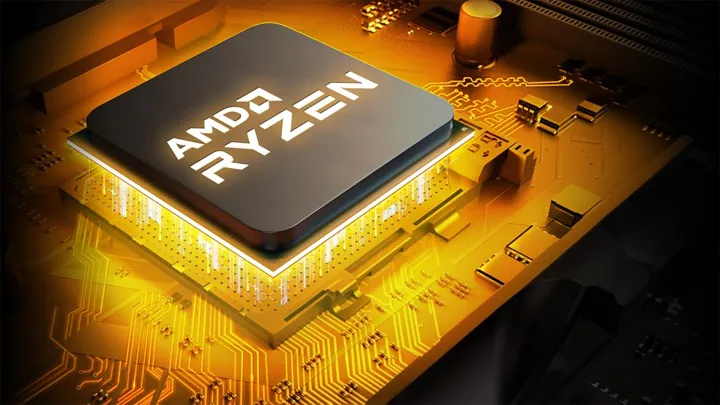
AMD is starting to ship its Ryzen 5000G APUs to manufacturers, and DIYers hoping to get their hands on the processors for later this year. The Ryzen 5000G series currently encompasses six models, ranging from the entry-level Ryzen 3 model to the high-end Ryzen 7 5700G, which is configured with eight cores and 16 threads and has a base clock speed of 3.8 GHz that can go to 4.6 GHz and has a maximum TDP of 65W.
In addition to the Ryzen 7 5700G, other models of AMD’s Ryzen 5000G family include the Ryzen 7 5700GE, Ryzen 5 5600G, Ryzen 5 5600GE, Ryzen 3 5300G, and Ryzen 3 5300GE. Of these models, the Ryzen 7 5700G, Ryzen 5 5600G, and Ryzen 3 5300G have a maximum TDP of 65W, while the Ryzen 7 5700GE, Ryzen 5 5600GE, and Ryzen 3 5300GE are low powered models that have a maximum TDP of 35W.
It should be noted — AMD benchmarked its processors against Intel’s older 10th-gen CPUs, rather than the newer 11th-gen processors with better Intel Xe graphics. The Ryzen 7 5700G will be 38% faster at content creation, 35% better in productivity tasks and 80% better in general computing performance than an Intel Core i7-10700, according to AMD’s own metrics in a report published by Guru3D.
The company revealed that these processors will be arriving “in the coming weeks” to pre-built systems.
The Ryzen 5000G APU was previously known by its codename of Cezanne. These processors are based on the 7nm Zen 3 microarchitecture alongside integrated onboard Vega graphics. The Ryzen 7 5700G will have an integrated Radeon GPU with eight graphics cores or 512 stream processors running at a frequency of 2.0 GHz, for example, while the Ryzen 3 5300G will have an integrated GPU with six graphics cores.
Pricing information was not immediately available, as these processors are headed to pre-built systems from PC manufacturers first, and we expect AMD will disclose pricing details when the chips are available for consumers to purchase.
Given the global semiconductor shortage that’s plaguing the CPU and GPU markets, it’s unclear if AMD’s latest 5000G series APUs will be well-stocked enough. Given that the prior generation Ryzen 4000 APUs were only available on pre-built systems, AMD’s expansion of the Ryzen 5000G to DIYers is good news for gamers looking to build their own rigs rather than invest in a pre-configured machine.



